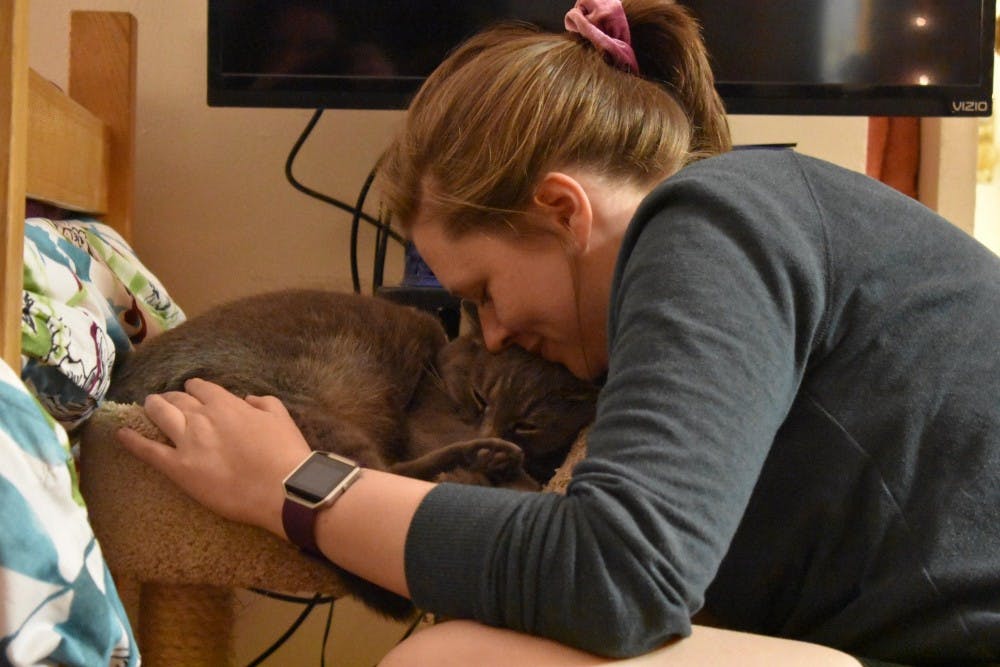"I got the vibe that it was very, 'You're welcome for providing these services, and don't take it for granted because it's a privilege, not a right,'” Wiggins said.
Wiggins registered her ESA cat Oliver with ARS, and he lived with her in Avery Residence Hall last year. Wiggins said she had worked with an advocate at her previous college to request accommodations, but when Wiggins transferred to UNC, she got the impression that UNC wasn't passionate about accommodating students.
"I was pretty disappointed with UNC's process,” Wiggins said. “It was very subjective, and there wasn't a lot of information about who was making these decisions.”
Wiggins said she has spoken with Student Body President Savannah Putnam's administrative team about removing some of the challenges associated with ARS.
"I have suggested a system design that's more wholistic, collaborative and advocates for the student,” Wiggins said. “That's the whole reason ARS is there, and the impression that students have is that ARS is protecting the entity of UNC and their academic integrity over the integrity of the student.”
Coming home
UNC junior Ally Yoder lives in Morrison Residence Hall with Marley, her Border Collie and Jack Russell Terrier mix whom she has had for three years. Yoder transferred to UNC as a sophomore, but didn’t live on campus until this year.
For Yoder, combining the constant therapeutic benefits Marley offers her with more traditional therapy methods on and off campus has given her a broader outlook on managing her mental health while in college.
"I've been to CAPS on campus and have gone to private therapy off campus, and I've found them both to be helpful,” Yoder said. “Doing them together and having an ESA is really helpful instead of just having one or the other."
She said coming home to Marley after a day of classes and other stressors is calming, and she is grateful UNC allows her to have Marley.
"She's really helpful to have in my dorm when I'm doing schoolwork or just whatever I'm doing because she lowers my anxiety,” Yoder said. “If I'm having a bad day, she knows how to comfort me the way I need.”
Living again
To get the day's news and headlines in your inbox each morning, sign up for our email newsletters.
Since she lives off campus, senior Emma Hayes did not go through ARS registration. However, she obtained documentation from her doctor allowing her ESA German Shepherd mix, Dexter, to travel and live in housing with no-pet clauses.
For Hayes, Dexter helps her cope with her PTSD symptoms.
“I was at the end of my rope because I'd tried a lot of different therapies and medications, and nothing was working as much as I'd hoped,” Hayes said. “So I researched getting an ESA, and it seemed like the logical thing to try next."
Hayes transferred to UNC as a junior, but got Dexter in February 2017. She rescued Dexter shortly after discussing an ESA with her doctor.
“I was pretty non-functional. I would have panic attacks, and I was really paranoid,” Hayes said. “Having Dexter really gave me something to focus on.”
Hayes is the founder and president of the UNC chapter of Survivor's Best Friend, a nonprofit that provides funding for sexual and domestic violence survivors to adopt animals as ESAs. She said the growing legitimacy of ESAs in the mental health field has opened the door for college students to have ESAs.
Now, Dexter lives with Hayes in off-campus housing, and she said she likes having that responsibility.
“It just gets me up to go do something every day,” Hayes said. “He's just a really goofy dog, and he will always be absolutely ecstatic to see me every time I come home."
arts@dailytarheel.com




